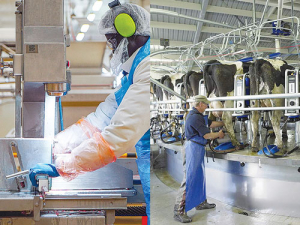A point in case is the zoonoses-infections that can pass naturally from animals to people, so easily contracted by those who work as dairy farmers, shearers and veterinarians. These include a host of infections with familiar names such as leptospirosis, cryptosporidiosis, campylobacter, salmonella and ringworm. Well known in New Zealand, Lepto, despite many years of vaccinations, is still found in around 30% of the nation’s dairy herd that pass the infection in their urine.
Indeed, the problem has a larger incidence than many other countries, with about 100 reported cases each year, but a likelihood that between 4000 and 5000 cases go unreported. Initial symptoms are said to be flu-like, but can also manifest as tiredness, severe, persistent headaches, high temperatures or chills, sweating, muscle or abdominal pain, nausea, vomiting or diarrhoea. Whilst levels of infection can be variable, symptoms can develop rapidly, and in some instances lead to permanent complications such as renal failure. Those severely affected might require two months away from work but can take up to twelve months to regain pre-infection energy levels.
Easily transferred via animal urine, particularly through cuts, scratches or grazes, via the mucous membranes of the eyes, the nose and mouth, it follows that those working with stock are at risk. Infections can eventuate from a fine spray of urine, urine-contaminated water in clean down areas of cow-sheds or stockyards, urine-soaked wool, and out on the farm from contaminated rivers, lakes, and flood-prone areas.
Although cows, and to some extent sheep, are often seen as the main ‘carriers’, but rats and mice are also important primary hosts, alongside mammals including dogs, deer, rabbits, and hedgehogs who are able to carry and transmit the disease as secondary hosts. Dogs in particular, may lick the urine of an infected animal off grass or soil, or drink from an infected puddle. Habitats most likely to carry the bacteria are muddy riverbanks, ditches, gullies, or muddy areas where there is regular passage of either wild or farm mammals. Interestingly, there is a direct correlation between the amount of rainfall and the incidence of leptospirosis.
Best management practise, besides vaccinating at-risk animals and controlling rodents should centre around good personal hygiene always, using equipment such as face masks, waterproof gloves and boots, alongside raising overall awareness of everyone on the farm, and understanding how to manage that risk.
The culture on the farm should see ready access to running water, soap, and a drying method such as disposable paper towels, followed by a good hand sanitiser or disinfectant- the days of a bucket and water and a cake of soap at calving, just doesn’t cut the mustard anymore. On the farm, workers should dry off urine splashes immediately, wash with soap and water, while any cuts and grazes should be washed thoroughly, then dried and disinfected. Likewise, it is critical that any splashes to the mouth, eyes, exposed skin and facial hair should be cleaned quickly and completely.
Persons who are “splashed” should inform their supervisors, with the event being noted in the farm incident register. Those experiencing symptoms, should see a doctor at the earliest convenience, to allow testing and treatment, while also informing the physician that “Lepto” is suspected. At the same time, if the infection is confirmed as being contracted in the workplace, the incident should be reported to WorkSafe NZ.
As we move into the calving season, and a working day that is time-poor, it is vital that hygiene is not overlooked, particularly before smoking or eating, as a few minutes saved can lead to a long time off work, and an illness that could take a long time to shake off.
















